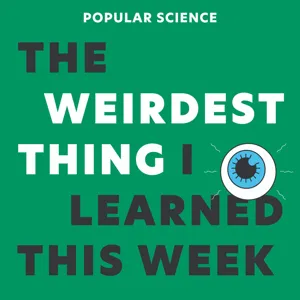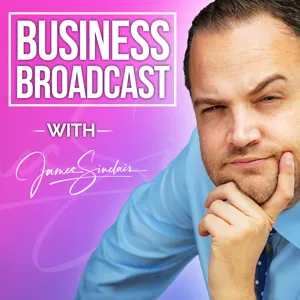Podcast Summary
Discovering Innovations in Agriculture and Home Projects: Bayer CEO Bill Anderson discussed using AI and advanced tech like CRISPR for sustainable food production. Digital tools like Angie's home service platform help manage home projects and connect with professionals.
Technology is playing a crucial role in addressing global challenges, such as increasing food production without the use of fertilizers, through the use of artificial intelligence and advanced technologies like CRISPR. This was discussed in the latest episode of the Tools and Weapons podcast featuring Bayer CEO Bill Anderson. Additionally, there are now digital tools available to help individuals manage home projects and connect with skilled professionals, making it easier to maintain homes and complete dream projects. Angie's home service platform is an example of this. Lastly, there are plenty of fascinating and weird facts out there, waiting to be discovered, as shared in the Weirdest Thing I Learned This Week podcast. From deadly mascara to a man's obsession with banning mundane things like coffee, these stories remind us of the importance of staying curious and open-minded.
Coffee's Controversial History in Europe, Particularly in Sweden: Despite high taxes, bans, and negative associations, coffee became popular in Sweden due to its association with intellectuals and radicals, and the difficulty of distinguishing local alternatives from real coffee. Coffee's foreign origins and xenophobic attitudes towards Turkish and Arabic culture also contributed to its controversial history.
The history of coffee consumption in Europe, particularly in Sweden, was contentious due to various reasons including taxation, association with radicals and foreign culture, and encouragement of local alternatives. In the late 1700s, coffee had become popular in Sweden despite the high taxes and eventual bans imposed by the monarchy. The coffee houses were seen as places where intellectuals and radicals gathered, leading to negative associations with the beverage. Additionally, the fact that coffee was not grown in Sweden and was considered a foreign import further fueled the anti-coffee sentiment. The monarchy also tried to encourage the consumption of local alternatives, such as Swedish coffee made from the Australagus boeticus plant. However, it was easy to pass off the local alternative as real coffee, leading to further bans. The coffee was also associated with Turkish and Arabic culture, leading to xenophobic and racist attitudes towards the beverage. The monarchy's efforts to discourage coffee consumption were not unique to Sweden, as coffee was initially viewed with suspicion in other European countries as well. Despite these challenges, coffee eventually became widely accepted and popular in Europe.
The history of coffee in Europe: cultural, economic, and medical influences: Europe's perception of coffee was shaped by cultural preferences, economic interests, and medical beliefs, leading to varying levels of acceptance. Sweden bucked the trend with a famous experiment debunking coffee's danger, but it remained illegal until the 19th century.
The perception and acceptance of coffee in Europe during the 17th and 18th centuries were influenced by various factors such as cultural preferences, economic interests, and medical beliefs. Coffee was initially viewed negatively in some countries due to its potential impact on wine and beer consumption, while others saw it as a useless and stimulating beverage. Sweden, however, held out against the anti-coffee trend for a long time. A famous story from Swedish history involves King Gustav III who, in an attempt to prove coffee's danger, had a prisoner drink large quantities of coffee and compared it to tea. Despite the long experiment, the coffee drinker outlived both the tea drinker and the king himself. The coffee ban in Sweden continued until the 19th century, with periods of legality interspersed with high taxes. Overall, the history of coffee in Europe is a fascinating reflection of societal values and beliefs during that time.
Coffee's journey in Swedish culture: Sweden's coffee tradition, represented by fika, reflects cultural shifts and endures as a cherished practice. Coffee is a top European consumer good, with benefits when consumed in moderation.
Sweden's relationship with coffee has undergone significant changes throughout history. While there were once attempts to ban coffee due to cultural and economic reasons, it is now a cherished part of Swedish culture, with the tradition of fika representing a leisurely and social coffee break. Sweden is among the top coffee consuming countries in Europe, with an average consumption of £18 per person per year. Despite earlier opposition, it is now recognized that coffee, consumed in moderation, can be beneficial. The history of coffee in Sweden is a fascinating example of cultural shifts and the enduring appeal of this popular beverage. Another interesting topic discussed was the use of back slang in the Swedish language, which led to the term "fika" meaning coffee break. This linguistic quirk is a reminder of the rich cultural history behind everyday practices and words. Additionally, it was mentioned that there are misconceptions about the health effects of coffee, with some people fearing caffeine overdoses. However, it was emphasized that coffee, when consumed in moderation, is generally considered safe and even has potential health benefits. Overall, the discussion highlighted the complex and evolving relationship between coffee, culture, and society, and the importance of accurate information and context when understanding historical events.
Ancient Egyptians used Kohl for Eye Makeup around 3110 BC: Eye makeup has a long history, dating back to ancient Egypt around 3110 BC, and was used for both cosmetic and protective purposes. It gained popularity in America during the 1920s and became widely accepted by the 1930s.
Eye makeup has a rich history that dates back to ancient civilizations, specifically ancient Egypt around 3110 BC. Kohl, a substance made from lead sulfide, was used by both rich and poor people to line their eyes for cosmetic and protective purposes. Queen Nefertiti is believed to have popularized this trend due to her iconic beauty. Eye makeup was not widely accepted in America until the 1920s due to societal stigmas, but the discovery of Nefertiti's bust and the rise of Hollywood movie stars changed that. Makeup became more accepted and popularized, leading to the norm of wearing makeup in the 1930s. Additionally, kohl and similar coal-based formulas are still used in some parts of the world, but are outlawed in the US due to dangerous levels of lead.
Early 20th century cosmetics lacked regulation, leading to dangerous products: The FDA didn't regulate cosmetics until 1938 after incidents involving harmful products, but it's important to be cautious even with regulated cosmetics.
The lack of regulation in the cosmetics industry during the early 20th century led to several dangerous and even deadly products being sold to consumers. Despite incidents involving harmful products like Koremleu, a hair removal cream containing rat poison, and Lash Lure, a mascara that caused blindness and death, the FDA did not regulate cosmetics due to their status as cosmetics and not drugs. This changed after the Lash Lure incident in 1933, leading to the passing of the Federal Food, Drug, and Cosmetic Act in 1938, which authorized the FDA to regulate cosmetics. Since then, the cosmetics industry has seen numerous fashion trends and makeup styles evolve, from the red lip and cat eyeliner of Rosie the Riveter to the natural and extravagant looks of today. However, despite regulation, it's important to be aware of potential risks and take precautions when using cosmetics.
A history of harmful substances in everyday items: Stay informed about potential risks in cosmetics and everyday items, as harmful substances are not a thing of the past.
Historically, people have used harmful and even poisonous substances in cosmetics and other everyday items, such as radium in slippers and condoms, without knowing the health risks. Regulations were not as strict back then, and consumers were often left to trust the marketing claims of companies. While progress has been made in regulating these substances, it's essential for consumers to remain vigilant and educate themselves about the products they use. The use of harmful substances in cosmetics and other items is not a thing of the past, and it's crucial to be informed about what we put on and in our bodies. The history of radium-infused products serves as a reminder of the importance of being aware of the potential risks and staying informed.
The Tragic Impact of Radium on Watch Dial Painters: Radium's discovery led to widespread use, but its high cost and dangerous properties resulted in misuse, causing severe health issues and fatalities for those who handled it, including watch dial painters, leading to lawsuits and financial struggles for those affected.
The use of radium, discovered in the early 20th century by Marie and Pierre Curie, led to tragic consequences for workers who handled it regularly. Most famously, this affected women who painted watch faces with radium, leading them to lick the paintbrushes for finer lines. This practice resulted in severe health issues, not just at work but also at home, as they brought the radium home with them. The women even used it to paint their teeth and nails, and wore glowing clothes to parties. A lawyer named Leonard Grossman fought for their rights, leading to lawsuits against the companies producing the radium watches. However, by the time they won, many of the women had already passed away. Radium was once considered a wonder substance, but its high cost and dangerous properties led to its misuse, resulting in devastating consequences. Marie Curie herself faced scandals and financial struggles, but was eventually able to secure funding for her research through a campaign led by American women. The price of a single gram of radium in the 1920s was equivalent to a Hollywood movie budget, reflecting the fascination and belief in its miraculous properties.
Historical use of harmful substances like radium: Though some substances offer short-term benefits, it's vital to consider long-term health risks before widespread use, as history shows with examples like radium and microplastics.
Throughout history, people have unknowingly exposed themselves to harmful substances, such as radium, for the perceived benefits, only to later discover the health risks. Radium, which was once popularly used in various consumer products like toothpaste, water, and even beer, was found to cause sickness and death due to its radioactivity. The long-term health effects were not immediately apparent, and it wasn't until lawsuits and investigations that the extent of the harm was revealed. Even today, we encounter similar situations with substances like microplastics, which are found in various consumer products and have potential health risks that are still being discovered. It's a reminder that while some substances may offer short-term benefits, it's crucial to consider the long-term consequences before widespread use.
Exploring the transient nature of trends and historical substances: Discover the risks of historical substances, learn about popular trend shifts, and find skilled professionals for home projects using services like Angie's List. Don't forget to reduce paint waste through recycling initiatives like PaintCare.
Podcasts, like popular science podcasts, can provide fascinating information but also come with potential risks. During a recent discussion, the hosts reflected on the transient nature of trends, using the example of coffee's popularity and the dangers of historical substances like radium. They also shared their amusing discoveries, such as the intriguing fact about the uranium tooth decoration trend and the importance of responsible handling. Another key takeaway from the conversation was the ease of finding skilled professionals for home projects using services like Angie's List. The hosts emphasized the importance of maintaining a home and the convenience of having access to local pros for various projects. They also highlighted the importance of reducing paint waste through recycling initiatives, such as those offered by PaintCare. Overall, the conversation touched on various topics, from the ups and downs of popular trends to the importance of home maintenance and waste reduction. It served as a reminder that while there are risks and challenges, there are also solutions and opportunities for learning and growth.




